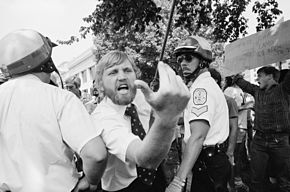The examples and perspective in this article deal primarily with the United States and do not represent a worldwide view of the subject. (June 2024) |

In the discourse, a heckler's veto is a situation in which a party who disagrees with a speaker's message is able to unilaterally trigger events that result in the speaker being silenced. For example, a heckler can disrupt a speech to the point that the speech is canceled.
In the legal sense, a heckler's veto occurs when the speaker's right is curtailed or restricted by the government in order to prevent a reacting party's behavior. The common example is the termination of a speech or demonstration in the interest of maintaining the public peace based on the anticipated negative reaction of someone opposed to that speech or demonstration.
The term heckler's veto was coined by University of Chicago professor of law Harry Kalven.[1][2] Colloquially, the concept is invoked in situations where hecklers or demonstrators silence a speaker without intervention of the law.
- ^ Hamlin, David (1980). The Nazi/Skokie Conflict: A Civil Liberties Battle. Boston: Beacon Press. p. 57. ISBN 0-8070-3230-1.
- ^ Gutterman, Roy S. "Gutterman Essay: Feiner and the Heckler’s Veto" Source: Journalism History, accessed 24 February 2020
